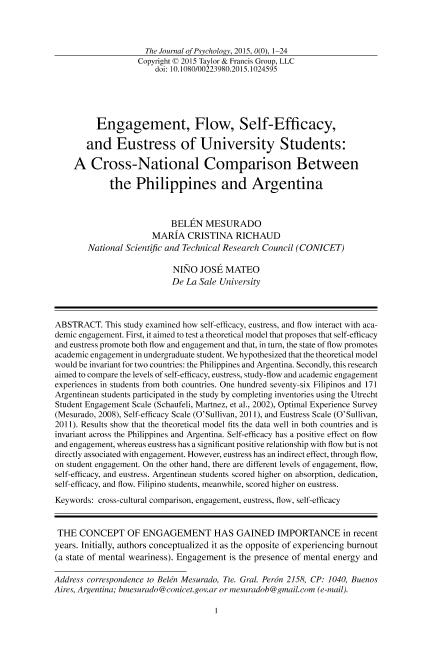Mostrar el registro sencillo del ítem
dc.contributor.author
Mesurado, Maria Belen

dc.contributor.author
Richaud, Maria Cristina

dc.contributor.author
Nino, Jose Mateo
dc.date.available
2018-03-26T18:51:14Z
dc.date.issued
2015-04
dc.identifier.citation
Mesurado, Maria Belen; Richaud, Maria Cristina; Nino, Jose Mateo; Engagement, Flow, Self-Efficacy, and Eustress of University Students: A Cross-National Comparison Between the Philippines and Argentina; Taylor & Francis; The Journal of psychology; 150; 3; 4-2015; 281-299
dc.identifier.issn
0022-3980
dc.identifier.uri
http://hdl.handle.net/11336/39959
dc.description.abstract
This study examined how self-efficacy, eustress, and flow interact with academic engagement. First, it aimed to test a theoretical model that proposes that self-efficacy and eustress promote both flow and engagement and that, in turn, the state of flow promotes academic engagement in undergraduate student. We hypothesized that the theoretical model would be invariant for two countries: the Philippines and Argentina. Secondly, this research aimed to compare the levels of self-efficacy, eustress, study-flow and academic engagement experiences in students from both countries. One hundred seventy-six Filipinos and 171 Argentinean students participated in the study by completing inventories using the Utrecht Student Engagement Scale (Schaufeli, Martínez, et al., 2002), Optimal Experience Survey (Mesurado, 2008), Self-efficacy Scale (O'Sullivan, 2011), and Eustress Scale (O'Sullivan, 2011). Results show that the theoretical model fits the data well in both countries and is invariant across the Philippines and Argentina. Self-efficacy has a positive effect on flow and engagement, whereas eustress has a significant positive relationship with flow but is not directly associated with engagement. However, eustress has an indirect effect, through flow, on student engagement. On the other hand, there are different levels of engagement, flow, self-efficacy, and eustress. Argentinean students scored higher on absorption, dedication, self-efficacy, and flow. Filipino students, meanwhile, scored higher on eustress.
dc.format
application/pdf
dc.language.iso
eng
dc.publisher
Taylor & Francis
dc.rights
info:eu-repo/semantics/openAccess
dc.rights.uri
https://creativecommons.org/licenses/by-nc-sa/2.5/ar/
dc.subject
Cross-Cultural Comparison
dc.subject
Engagement
dc.subject
Eustress
dc.subject
Flow
dc.subject
Self-Efficacy
dc.subject.classification
Psicología

dc.subject.classification
Psicología

dc.subject.classification
CIENCIAS SOCIALES

dc.title
Engagement, Flow, Self-Efficacy, and Eustress of University Students: A Cross-National Comparison Between the Philippines and Argentina
dc.type
info:eu-repo/semantics/article
dc.type
info:ar-repo/semantics/artículo
dc.type
info:eu-repo/semantics/publishedVersion
dc.date.updated
2018-03-26T17:48:15Z
dc.identifier.eissn
1940-1019
dc.journal.volume
150
dc.journal.number
3
dc.journal.pagination
281-299
dc.journal.pais
Estados Unidos

dc.journal.ciudad
Philadelphia
dc.description.fil
Fil: Mesurado, Maria Belen. Consejo Nacional de Investigaciones Científicas y Técnicas. Oficina de Coordinación Administrativa Saavedra 15. Centro Interdisciplinario de Investigaciones en Psicología Matemática y Experimental Dr. Horacio J. A. Rimoldi; Argentina
dc.description.fil
Fil: Richaud, Maria Cristina. Consejo Nacional de Investigaciones Científicas y Técnicas. Oficina de Coordinación Administrativa Saavedra 15. Centro Interdisciplinario de Investigaciones en Psicología Matemática y Experimental Dr. Horacio J. A. Rimoldi; Argentina
dc.description.fil
Fil: Nino, Jose Mateo. de la Salle University; Filipinas
dc.journal.title
The Journal of psychology
dc.relation.alternativeid
info:eu-repo/semantics/altIdentifier/doi/http://dx.doi.org/10.1080/00223980.2015.1024595
dc.relation.alternativeid
info:eu-repo/semantics/altIdentifier/url/https://www.tandfonline.com/doi/full/10.1080/00223980.2015.1024595
Archivos asociados
